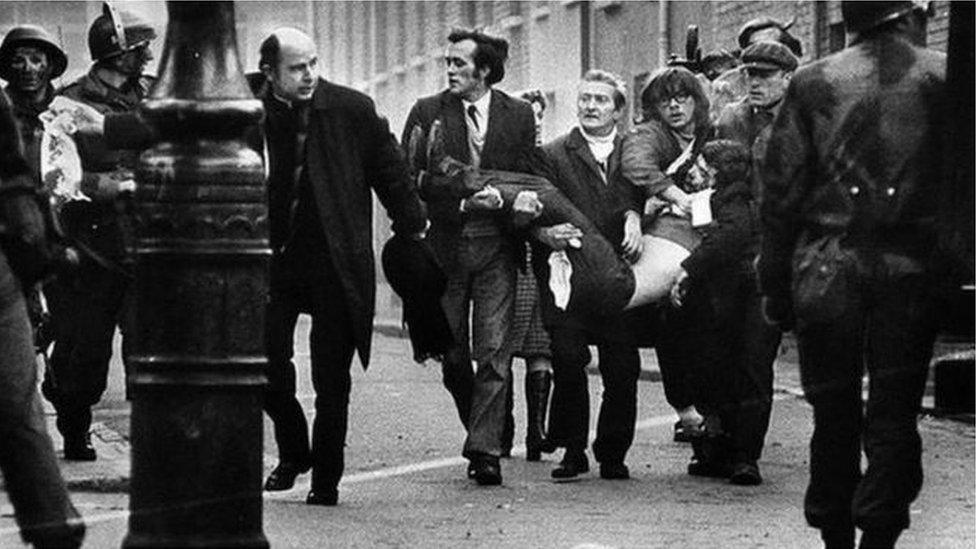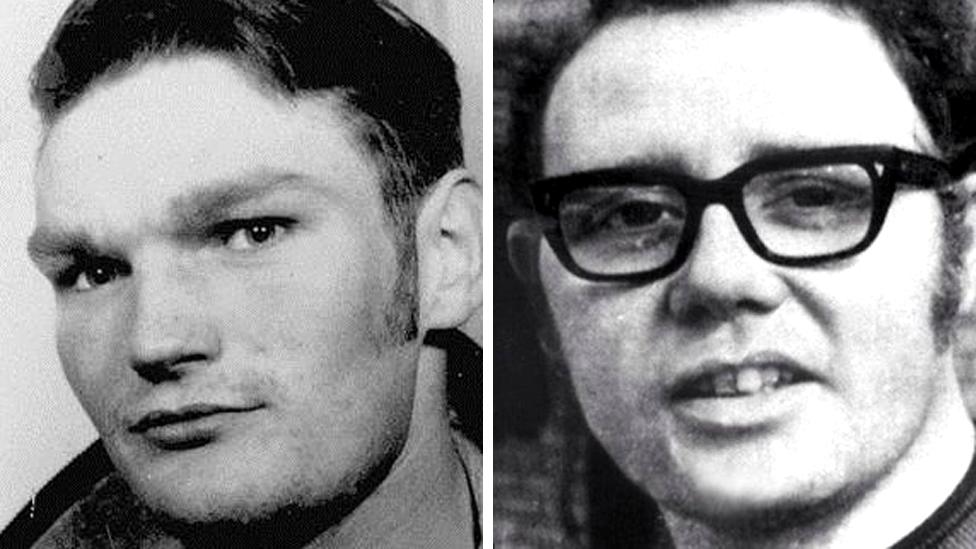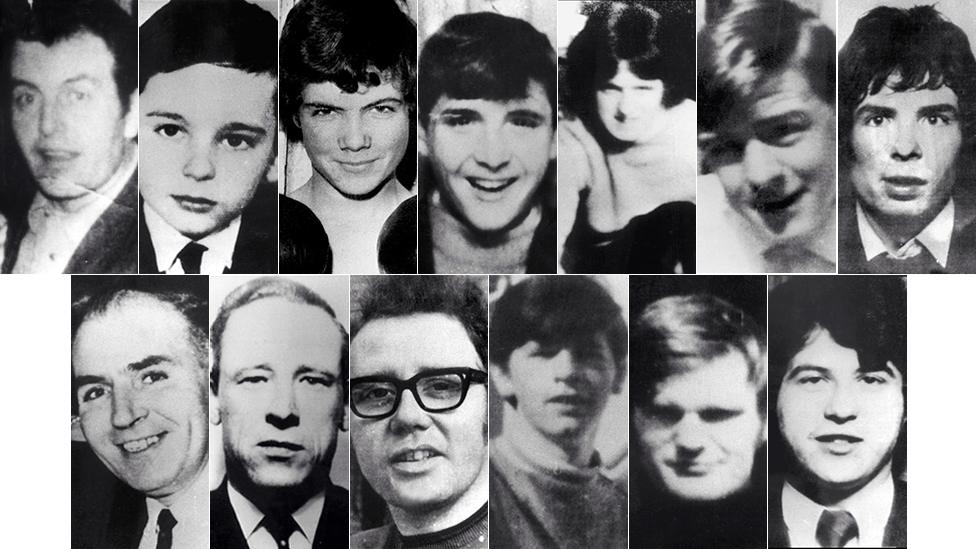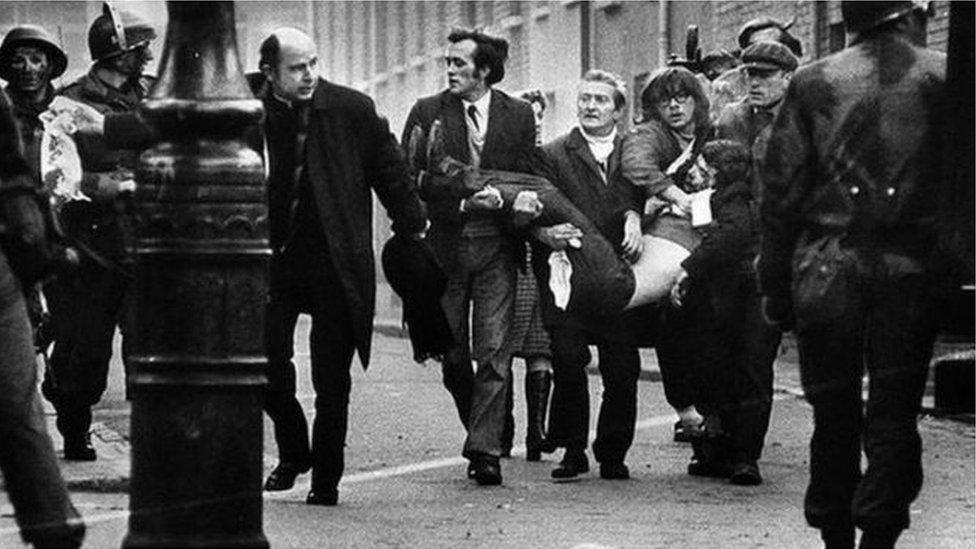Bloody Sunday: Soldier F 'has no reliable recollection' of shootings
- Published

Thirteen people were killed and 15 wounded on Bloody Sunday
A soldier accused of murdering two men on Bloody Sunday in 1972 has said he will not answer questions about the shootings because he does not have a "reliable" memory of what happened.
Thirteen people were shot dead when the Army's Parachute Regiment opened fire on a civil rights march in Londonderry.
Soldier F has been charged with two murders and five attempted murders.
His comments from a police interview in 2016 were revealed after a court ruling on his case in Derry on Friday.
A judge determined that statements from military witnesses could be used as evidence in the case against Solider F, who cannot be named for legal reasons.
One victim's brother has welcomed the judge's decision.

James Wray (left) and William McKinney were among those who were killed on Bloody Sunday
Soldier F is being prosecuted for the murders of William McKinney and James Wray in the Bogside, a predominantly Catholic-populated part of Derry on 30 January 1972.
That day became known as Bloody Sunday and is widely regarded as one of the darkest days of the Troubles in Northern Ireland.
In his determination on Friday, District Judge Ted Magill revealed that Soldier F was interviewed on 8 March 2016 about what happened on Bloody Sunday.
The former paratrooper said: "While I am sure I am properly discharged in my duties as a soldier on that day, I no longer have any reliable recollection of these events.
He added: "I am not, therefore, able to answer your questions and will not be drawn into speculating or guessing.
"For that reason I will not be answering any questions put to me."

Who is Soldier F?
A former British soldier who served with the Army's Parachute Regiment in Northern Ireland during the Troubles
He cannot be named due to an interim court order granting his anonymity
Soldier F is being prosecuted for the murders of William McKinney and James Wray on Bloody Sunday
He also faces charges of attempting to murder Patrick O'Donnell, Joseph Friel, Joe Mahon, Michael Quinn and an unknown person on the same date

Judge Magill's ruling centred on an attempt by prosecutors to use evidence statements given to the 1972 Widgery Report - the first inquiry into the events of Bloody Sunday - by other soldiers present on the day.
He told Londonderry Magistrates' Court that he was satisfied the statements could be dealt with in a "fair, just and reliable fashion" by a trial judge.
He ruled that the evidence of a sixth witness was not to be admitted.
Judge Magill said that even without the defendant giving evidence, Soldier F's lawyers had a wealth of material to contest the case, including the reliability of prosecution evidence.
William McKinney's brother Michael said the ruling meant the case could now "move forward".
"When we went into that courtroom we were not sure that we would be standing here today thinking the Soldier F case is over and not one soldier would have been brought to book for their actions on Bloody Sunday," he said.
"What I hope will happen is that Soldier F will be returned for trial, that it will go to a full hearing and the case will start, the sooner the better."
The case against Soldier F was dropped by prosecutors in July 2021 after the collapse of the trial of two other Army veterans who were accused over another killing during the conflict in Northern Ireland.
At the time the families of the Bloody Sunday victims said the decision was a "damning indictment of the British justice system" and added that they would challenge it.
Bereaved relatives then brought a successful legal challenge against the decision to discontinue the Bloody Sunday prosecution.
The court then rejected a bid by the Public Prosecution Service to have its appeal referred to the UK Supreme Court.
Prosecutors subsequently reviewed their position and then announced it had decided to resume the prosecution in September last year.
- Published2 July 2021

